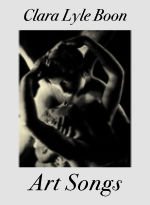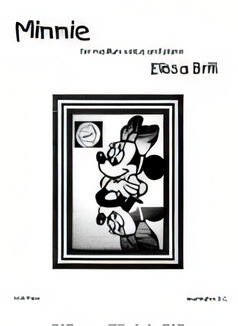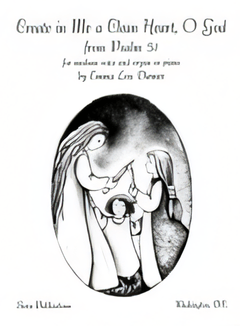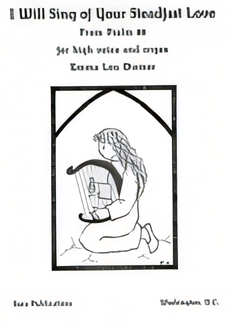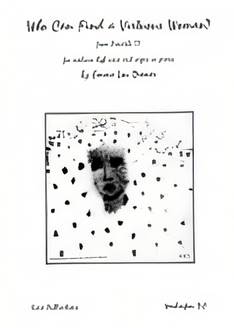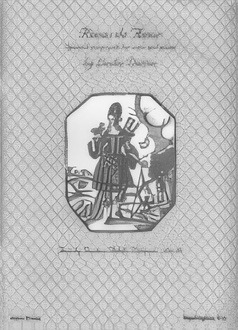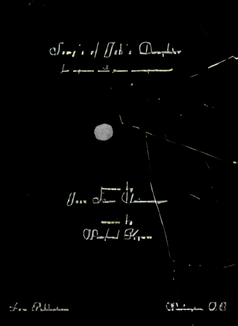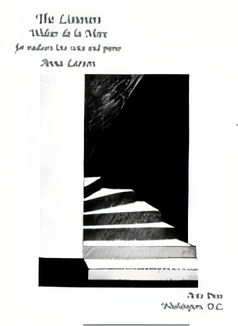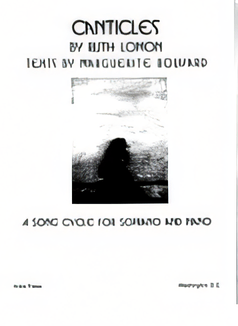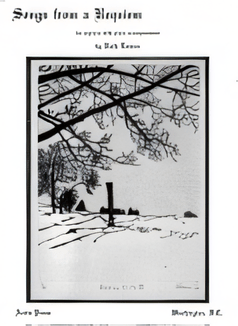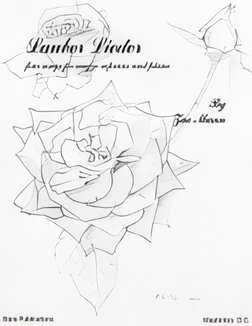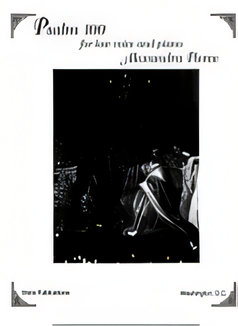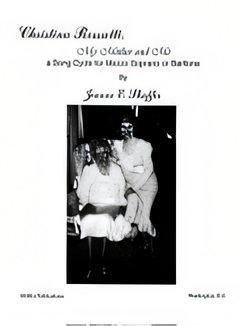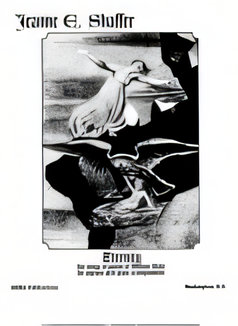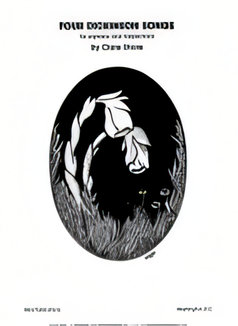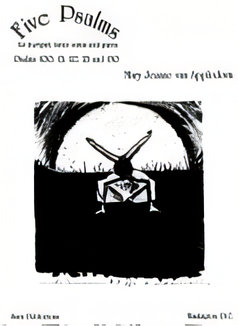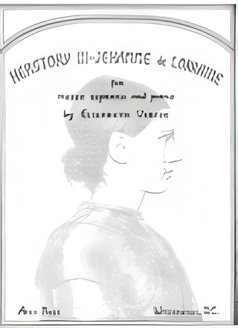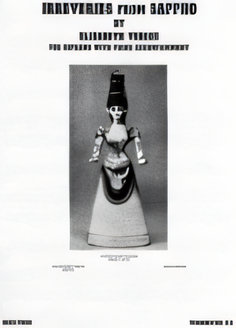Voice & Keyboard
Bohun, Lyle de
Art Songs
All of Lyle de Bohun’s songs are poignantly influenced by the melodic folk traditions of the Appalachian Mountains where the composer spent her childhood. Nevertheless, some melodies are unabashedly twelve-tone rows. This is essentially a collection of love songs with the exception of Beyond the Stars, Lovely Heart, Slumber Song, and When Songs Have All Been Sung, which offer commentary on the meaning of human existence.
Brill, Elissa
Minnie
Minnie is a light-hearted setting of Eleanor Farjeon’s humorous poem about Minnie who just could not make up her mind. The song is a whimsical caricature that spotlights both the vocal and theatrical talents of the performer. It is an audience pleaser that easily fills the spot for humor on a concert program.
The score is available from J.W. Pepper.
Diemer, Emma Lou
Create in Me a Clean Heart, O God
from “Psalm 51” for medium voice and organ or piano
The music is quite tonal, very expressive and moving. A portion of the piece appears as an Offertory response in The New Century Hymnal.
The score is available on Amazon.
I Will Sing of Your Steadfast Love
from “Psalm 89” for high voice and organ
This is a joyous solo, rhythmic and colorful, ending with a jubilant expression of praise.
There is a circulating copy of the score at the New York Public Library.
Who Can Find a Virtuous Woman?
from “Psalm 31” for medium high voice and organ or piano
This is a joyous solo, rhythmic and colorful, ending with a jubilant expression of praise.
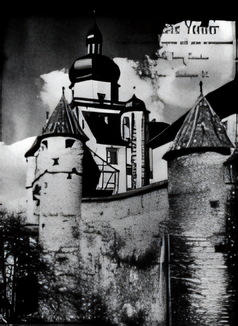
Donahue, Bertha Terry
The Castle Yonder
a cycle of songs for soprano with piano accompaniment
These songs are settings of poems by children collected by Richard Lewis in his book Miracles, published by Simon and Schuster, New York 1966. They reflect a mother’s comprehension of a child’s world interwoven with her own. The six songs are titled: The Castle Yonder, The Dew, Household Problems, Rain, A Cat, and The Four Winds.
The score is available at the Manchester Library, U.K..
Dutton, Leslie
Rimas de Amor
Spanish song cycle for voice and piano
Rimas de Amor is dedicated to John Gillas, Professor of Horn at Texas Tech University. The cycle consists of six poems by the Spanish Romantic poet, Gustavo Adolfo Becquer (1836-70). Most of the songs are through-composed except for #2 which is ternary and #1 which is strophic in form. The composer writes that it is her interest in the language and culture of the West Texas area that inspired her to select these poems for her song cycle.
The score is available at the Penn State University Library.
Hyson, Winifred
Songs of Job’s Daughter
for soprano with piano accompaniment
These songs were a prize winner in the 1971 Mu Phi Epsilon Composition Contest, and was the required selection for sopranos in the 1980 Mu Phi Sterling Staff Competition.
The six songs on texts by Jean Starr Untermeyer comment on the ultimate lack of real life choices for a woman, the ambiguous feelings of a young mother, and the rapture of fulfilled love.
One of the songs is available on Spotify.
Larson, Anna
The Listeners
for medium low voice and piano
The composer describes her dramatic narrative setting of the poem by Walter de la Mare: “This setting of The Listeners was written in the late 1970’s as a surprise gift for my father, Arthur Larson, at the suggestion of my mother who sent me several of his favorite poems. I was immediately drawn to this text because it combines a beautifully crafted dramatic form with a stirring expression of human integrity in a world where absolute knowledge is mysteriously withheld.”
The score is available through the composer’s website.
Lomon, Ruth
Canticles
for soprano and piano
The texts are by Marguerite Bouvard and the music is dedicated to her. There are three canticles: Honoring the Hidden Work, Mindfulness, and Questions.
The score is available from J.W. Pepper.
Songs from a Requiem
for soprano with piano accompaniment
“Lomon’s intense, emotional songs have profile and character.” (Boston Globe)
The songs are inserts in the setting of a Requiem Mass composed by Ruth Lomon in 1977, and dedicated to the memory of her sister. The Mass is set for chorus with trumpets and trombones. The songs, settings of poems by the composer from 1970-72, are orchestrated for soprano, flute, clarinet, bass clarinet, and bassoon. Thisversion for soprano and piano was written in 1982. The titles are: Les Baux, Interregnun, The Mammoth Head, Cancrizans, Black Mesa, and Incantation.
There is a circulating copy of the score at the New York Public Library.
Munn, Zae
Lauber Lieder: Four Songs for Soprano and Piano
The titles are: The Slowly Opening Rose, I have Washed and Buttoned Up, Geese Along the Flowage, and The Sermon. The texts of these emotionally direct and attractive songs are by Peg Carlson Lauber, with whom Zae Munn has collaborated on other works. The poems are linked by the theme of coping with, and overcoming burdens and challenges. The songs were written in the summer of 1994, and while conceived as a set, may be performed separately.
The score is available from J.W, Pepper.
Pierce, Alexandra
Psalm 100
for low voice and piano or high voice and piano
Written in 1993, the piece is dedicated to Tina Haddon. It contains strong shifts of character, ornamentation with a Middle-Eastern flavor, and a vocal part for an agile and lyric soprano. The piece is written to be freely danced or gestured as it is sung (if desired). The pianist is an equalpartner to the singer.
Shaffer, Jeanne
Christina Rossetti, My Mother and Me
A cycle of five songs for mezzo or baritone & piano
Dedicated to her mother, the piece is the composer’s Op. 207. The titles of the songs are: Up-Hill, Sleeping at Last, Song, Remember, and Another Spring. The poems are about life, death, and using well our time with those we love. The first performance was at the National Gallery in Washington, D.C.
Eternity – Five Songs to poems of William Blake
for soprano with piano accompaniment
” It was well crafted not only with technical skill but, more important, with audience awareness and a sense of the value of communication.” (The Washington Post)
Composed in 1992, Eternity has five parts: The Wild Flower’s Song, Soft Snow, Infant Joy, Infant Sorrow, and Eternity. The first version of this piece was performed at the Piccolo SpoletoFestival in Charleston, SC. The published version was first performed at the 1996 Women’s Music Festival at Indiana University of Pennsylvania.
Shore, Clare
Four Dickinson Songs
A cycle of five songs for mezzo or baritone & piano
“…interesting contrapuntal writing”(NY Times)
Written in 1981-82, the songs to texts by Emily Dickinson have the following titles: With a Flower, I’m Nobody, Summer Shower, and I Shall Know Why.
There is a circulating copy of the score at the New York Public Library.
Van Appledorn, Mary Jeanne
Five Psalms
for trumpet, tenor voice and piano
“…interesting contrapuntal writing”(NY Times)
Written in 1998 and based on Psalms 100, 13, 117, 23 and 150.
Vercoe, Elizabeth
Herstory III: Jehanne de Lorraine (Joan of Arc)
for soprano and piano
“The most powerful work I know by a woman on a feminist theme.” (Washington Post)
“This extraordinary work would be a wonderful second half for any vocal recital.” (The NATS Journal)
Herstory III was commissioned by Austin Peay State University in Tennessee and was premiered there in 1986. The composer writes: “My monodrama on the 19-year-old Joan of Arc is based on writers from Shakespeare and Shaw to Mark Twain and Christine de Pisan. Documents from Joan’s trial show her faith and her sharp tongue which emerge as fresh today as in 1429, the year of her trial and death. The piece is intended as a dramatic performance with lighting and costume, and is in twelve sections. There are set pieces, combinations of speech and music, some special effects (gong, finger cymbals, woodblock and use of mallets or fingers directly on the piano strings) and a return to the spare simplicity of the beginning in the concluding prayer.”
The score is available from the American Composers Alliance.
Irreveries from Sappho
for mezzo or soprano and piano
“hugely funny, elegant” (St. Louis Dispatch)
The titles are: Andromeda Rag, Older Woman Blues, and Boogie for Leda.
Irreveries from Sappho is wickedly satiric and full of musical jokes and parodies. The composer comments: “Although Sappho’s poetry is over 2500 years old, it seems remarkably up-to-date. Its wit calls for whatever musical sleight of hand a composer might muster: thus, the use of popular idioms and hidden tunes (Turkey in the Straw, Auld Lang Syne), as well as the more respectable tricks of the trade, such as counterpoint and recitative. Sappho’s three women have clearly distinctive voices, but all three bespeak a fierce pride.”
The score is available from the American Composers Alliance.

